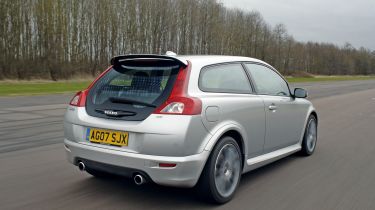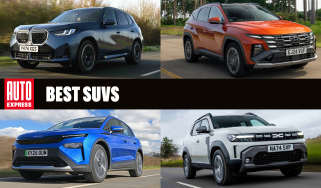Volvo C30
Head-turning looks and premium badge make C30 a strong choice
For proof that everyday hatchbacks don’t have to be boring, check out Volvo’s C30. The Swedish brand wants its smallest model to appeal to younger buyers who value style as much as driver appeal. And this
car certainly has the image to pull them in.
The well proportioned three-door looks familiar from the front, with an S40-style grille – and this makes the unusual rear even more of
a contrast. Step round the back and you’ll find it dominated by a large, U-shaped glass tailgate, reminiscent of Volvo’s 480ES – a car that caused an equally big stir when launched in 1987.
Designers have been adventurous, and the coupé-like shape gives the C30 a sporty presence – although it can’t quite match the dynamic Vauxhall for aggression. However, a quick poll in the Auto Express office revealed that most staff prefer the looks of the C30.
The three-door bodystyle does make getting into the back tricky, and once there, passengers will find it tight for knee and elbow space. Still, two adults can squeeze in and the seats fold down easily to increase the boot capacity to 1,010 litres. To be fair, this will probably be adequate for most owners, and Volvo doesn’t pretend that the car is especially practical.
Used - available now

2023 Kia
Sportage
15,890 milesAutomaticPetrol1.6L
Cash £27,902
2023 Ford
Fiesta
11,620 milesManualPetrol1.0L
Cash £17,640
2023 Honda
Jazz
11,725 milesAutomaticPetrol1.5L
Cash £18,550
2023 Ford
Puma
15,000 milesManualPetrol1.0L
Cash £19,118Yet it’s hard to defend the layout of the load bay. The C30 has clearly sacrificed practicality in the name of style – the tailgate’s shape means the opening is narrow and compromised by a high sill, while the raised boot floor is the narrowest and shortest in this test. On paper, the C30 has the most luggage space, but in everyday use it seems considerably smaller. The flimsy fabric parcel shelf is another cause for complaint.
Thankfully, the excellent driving environment makes up for these shortcomings. You can see where your money goes, because the C30 has a quality feel that no rival here can match, and it’s wonderfully executed, too. The floating centre console is now a familiar feature, but still impressive, and we like the neat controls.
Yet while the C30 appears very modern, the D5 engine is showing its age. First introduced in 2001, it’s not as refined as newer powerplants, even if recent upgrades mean it still delivers plenty of punch, with up to 400Nm of torque.
In larger cars, mating this oil-burner to Volvo’s Geartronic transmission works well, but we’re less convinced in the supposedly sporty C30. It is slow to respond to throttle inputs and provides jerky changes. While that didn’t prevent the car posting a good 0-60mph time of 8.0 seconds, the gruff engine note isn’t particularly pleasant.
The spongy brakes don’t add to the driving appeal, and the Volvo is not as sharp as the Vauxhall through corners. There’s ample grip, but body control could be better and it’s the least agile car here. The steering is short on feel, and over broken surfaces there’s excessive kickback. Still, the ride and refinement are good, making the C30 the best choice for motorway miles.
Unsurprisingly, in this company the premium brand model looks expensive.
Our range-topping R-Design SE Sport costs a hefty £24,270. While the R-Design effectively replaces the Sport trim, it does more to enhance the looks, with a colour-coordinated bodykit and unique alloy wheels. Yet it’s still £8,775 more than the Kia. Admittedly, you get the prestige of the Volvo badge and that superb design, but is this enough to justify the big price difference?
Details
Price: £24,270
Model tested: D5 R-Design
Chart position: 1
WHY: Influenced by small Volvos of the past, the C30 is a stylish premium hatchback alternative.
Economy
According to official figures, the C30 should be 10mpg less efficient than the Pro_cee’d. But even though its engine is much more powerful, we averaged 35.3mpg. The high price of diesel means it’s still the most costly to fuel, though.
Residuals
With Volvo’s premium image, it is no surprise that the C30 has the best residual values here – it holds on to 44.9 per cent. However, its relatively high list price means it loses more than £13,350 over three years.
Servicing
Volvo’s garages were the best performers of these three marques in our Driver Power 2007 dealer survey, finishing 12th out of 32. But owners criticised them for value for money – no surprise, with three C30 services at £960.
Tax
The Geartronic option pushes the C30’s CO2 emissions up to 182g/km. The high list price hampers it further, and even lower-band owners will face an annual tax bill of £1,388 – more than double that of the Kia.







